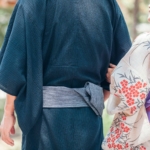Jinbei (Yukata))and geta
Since its summer in Japan, I purchased a Jinbei and Geta on an online store. The reason why I bought those were I wanted a Japanese clothes that Japanese called “Wafuku” ’和服’, I played the video game named “ Ghost of Tsushima” and I watched the anime named “Tokyo Revengers”.
What’s the Jinbei?
A Jinbei (alternately jinbē) is a tradicional set of Japanese house clothing worm by men or children during summer. Consisting of a side-tying, tube-sleeve kimono-style top and a pair of trousers, jinbei were originally menswear only, though in recent years, women’s jinbei have become popular.
https://en.wikipedia.org/wiki/Jinbei
- A Jinbei are made from cotton or hemp.
- The top is wrapped left over right, with the internal ties fastened before the external ones.
The first time it is tied on left inside and the second time one is tied on right outside. - The trousers resemble half pants up to knee-length..
I’ve seen the people who wear a Jinbei or a Yukata in the summer festival, fireworks festival sometimes.
What’s geta
Geta are a from of Japanese footwear resembling flip-flops. They are a kind of sandal with a flat wooden base elevated with up to three (though commonly two) “teeth", held on the foot with a fabric thong, which keeps the foot above the ground.
Geta are primarily worn with yukata, but sometimes also with Western clothing during the summer months.
As geta are usually worn only with yukata or other informal Japanese clothes or Western clothes, there is no need to wear socks.
Geta are not normally worn in snow, because snow often gets stuck to the teeth of the geta, making it difficult to walk. However, in historical times, they were worn in the snow.
https://en.wikipedia.org/wiki/Geta_(footwear)
- The supporting blocks below the base boards, called the ha (歯, lit., “tooth"), are also made of wood, usually very light-weight paulownia wood (known as kiri (桐)) or Cryptomeria wood (known as sugi(杉).
- Inside the hanao is a cord (synthetic in modern times, but traditionally hemp) that is knotted in a special way to the three holes of the dai.
- A traditional saying in Japanese translates as “You don’t know until you have worn geta." This means roughly, “you can’t tell the results until the game is over."
July,9 2021(Fri.) 7:37pm


